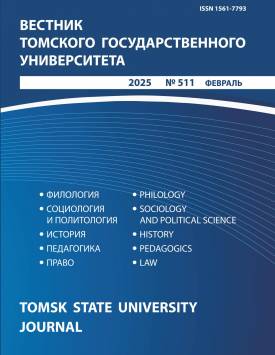Kazan theater criticism about stagings of Alexander Ostrovsky's Without a Dowry in 1879
The article examines the notes of two anonymous theater critics from Kazanskiy Birzhevoy Listok [Kazan Stock Exchange Newspaper], a commercial, public, and literary newspaper, regarding the productions of Alexander Ostrovsky's Without a Dowry at the Kazan Theater in 1879. Three stagings of the piece were presented in Kazan: the premiere by amateur actors on 29 January, a mixed (amateurs and professionals) production at the Summer Theatre on 27 May, and a professional production at the City Theater on 5 October. The first critic, named Wedion, had been contributing to the newspaper since 1877 and referred to himself as a "theater chronicler". The second critic, named Nevedion [I'm-not-Wedion], appeared for a brief period between April and October, 1879. During this time, he offers a critique of Wedion's opinions and puts himself in opposition to Wedion. Wedion relies heavily on Nikolay Dobrolyubov's criticism. The critic considers the social context and the balance of power in Bryakhimov's society to be important. In this context, Larisa is presented as a part of Ogudalova's circle and criticized. The heroine's feelings are a manifestation of banality and inexperience. She appears to be a frivolous person, ruled by impulses of feeling and naive romantic patterns. Paratov is also placed in the field of banality; he is equalized with the rest of the faceless representatives of the nobility, whose actions are guided by selfish motives. Karandyshev, with whom Wedion aligns his role as an interpreter, is the sole bearer of unselfish love in the play. As a result, for the critic he is the only character that arouses sympathy, which is why he is appointed the play's protagonist. Nevedion presents the romantic and the realistic as equally valid aspects of the drama, focusing his attention on Larisa and her feelings for Paratov. The critic regards the heroine as the bearer of a profound love, ennobled by sincerity and aspiration towards the ideal. She is set in opposition to the values and practices of Ogudalova's society, functioning as the primary conveyor of the author's ideas. In the critic's view, Karandyshev represents the epitome of vulgarity. His entire being is aimed at rising above the Bryakhimov's society, and his bride is disgusted by him. Nevedion's note about the production of Without a Dowry in October 1879 provides a comprehensive analysis of the provincial actress Iraida P. Umanets-Raiskaya's play. Her interpretation among the famous performers of the role of Larisa is characterized by a stormy temperament and a meticulous examination of Paratov, which aims to uncover his true identity. Furthermore, the critic's review ascertains the involvement of the Kazan theater director Pyotr M. Medvedev's troupe in replacing Mikhail Glinka's romance on lyrics by Yevgeny Baratynsky with the romance You Betrayed Me, and Tears Are Flowing... This version of the play became prevalent on the stage of the Russian theater and persisted at least until the end of the 19th century, which is proved by Anastasia Tsvetaeva's impressions of such performance at Moscow's Korsh Theater in her autobiographical book Dym, Dym and Dym [Smoke, Smoke, and Smoke]. In light of the reference to the Kazan press, it becomes evident that there was a bidirectional interaction between metropolitan and provincial theaters. The author declares no conflicts of interests.
Keywords
Alexander Ostrovsky, Without a Dowry, Kazan theater, Kazanskiy Birzhevoy Listok, theatre criticism, stage interpretation, romanceAuthors
| Name | Organization | |
| Panamarev Ivan V. | National Research Tomsk State University | ivanpanamareff@gmail.com |
References

Kazan theater criticism about stagings of Alexander Ostrovsky's Without a Dowry in 1879 | Vestnik Tomskogo gosudarstvennogo universiteta – Tomsk State University Journal. 2025. № 511. DOI: 10.17223/15617793/511/3
